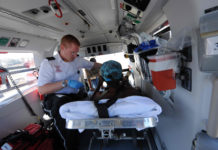It’s no secret that the United States is in desperate need of nurses. Due to patients living longer, educational bottlenecks and a staggeringly high turnover rate in the healthcare industry, the nursing shortage is becoming a growing problem. It’s starting to put serious pressure on nursing staff around the country.
As a nursing student, you’re probably well aware of these issues. In fact, it may even be one of the primary reasons you’re pursuing a nursing career in the first place. After all, what could be more fulfilling than providing care and support for patients who desperately need it?
There are several areas—both physical and occupational—where the need for nurses is at an all-time high. If your true calling is to make a difference in the lives of your patients, here are six nursing shortage facts that may influence where you end up after graduation.
1. California has the greatest nursing shortage of any state.
Although California employs the highest number of registered nurses in the country, it needs more—a lot more, in fact. According to a 2017 report by the Health Resources and Services Administration, California is predicted to have the highest demand for nurses in the country, with a shortage of nearly 45,000 registered nurses.
With its strong economy and thriving metropolitan areas, California has long been a desirable place to live. If you’re thinking about working as a nurse in the Golden State, check out the California Nursing Students’ Association (CNSA) for mentorship and networking opportunities.
2. Rural towns need the most help.

If you prefer small-town life to the hustle and bustle of urban living, healthcare institutions in rural America will gladly accept your help. Attracting and retaining qualified nurses has long been a problem for hospitals in rural locations. It’s mainly due to the lower pay rate and less lively social scene.
While the pay may be lower, the cost of living is often lower as well. Plus, you’ll never deal with the insane traffic that you’d find in a metropolitan area. For nursing students who truly want to make a difference, the rural healthcare workforce is in desperate need of help.
3. Demand for certified nurse-midwives is growing.
What could be more meaningful than caring for the newest generation?
Certified nurse-midwives are experiencing a huge surge in demand lately as more couples wish for positive and natural birth experiences.
According to statistics from the Bureau of Labor Statistics, employment of nurse midwives is expected to grow 21 percent by 2026, with 1,700 jobs created in this occupation. As an added bonus, you’re looking at a median wage of $106,910 for this field, per estimates from the Bureau of Labor Statistics.
4. Certified nurse anesthetists, dialysis nurses and other nurse specialties are growing, too.
In addition to certified nurse midwives, there is a growing number of in-demand nurse specialties that nursing students should consider. Making one of these specialties your primary focus can help you facilitate change in the healthcare industry and pave the way towards a fulfilling career:
●Certified Registered Nurse Anesthetist (CRNAs): CRNAs work with surgeons, anesthesiologists and other healthcare professionals to safely deliver anesthesia to patients. CRNAs are one of the higher-paying fields in the industry, with a mean annual wage of $174,790.
●Certified Dialysis Nurse: As our population continues to age, the need for dialysis services is growing. A certified dialysis nurse assists their patients with kidney function issues by supporting the administration of dialysis with a physician. Growth for this job is steady and is expected to increase 26 percent over the next decade.
●Pediatric Endocrinology (PED ENDO) Nurse: As a PED ENDO nurse, you’ll provide care and support for children with endocrine disorders such as diabetes or hypoglycemia. Unfortunately, the need for this occupation may be growing due to our increasing risk of diabetes and obesity.
5. The need for nurse educators has never been greater.

One of the reasons why the country is facing such an immense shortage of registered nurses is partly due to educational bottlenecks. With an aging faculty, budget issues and low pay, the demand for nurse educators is at an all-time high.
According to a 2017 study published in Nursing Outlook, one-third of current nurse educators are expected to retire by 2025. Most younger faculty members who may potentially replace them don’t have nearly the same level of experience as their older counterparts.
To address this shortage, many nursing programs and organizations are providing more funding for nursing students. These programs aim to help them seek doctoral degrees to replenish the supply of nurse educators and researchers. If you’re a current nursing student, don’t be afraid to talk with your advisor. You can also talk to your senior nursing students about pursuing a doctoral degree.
6. Travel nurses can greatly benefit nurses and hospitals alike.
Travel nursing is just one of the ways in which the nation is addressing the decades-long nursing shortage. Being a travel nurse is exactly what it sounds like: You sign a short-term contract and travel to wherever you’re needed most, often for much better pay than staff nurses.
If you’ve always dreamed of packing your nursing bag to see more of the world while making a positive difference in the lives of your patients, becoming a travel nurse can help you achieve both. Although you need roughly 18 months of experience in a nursing specialty to be a travel nurse, the opportunity to travel internationally or across the country for a high pay rate is undeniably appealing.
As a nursing student, you have the potential to make a huge impact in your community. Whether it’s by pursuing a doctoral degree or living the life of a traveling nurse, your choices going forward can make all the difference. By keeping these six nursing shortage facts in the back of your mind, you can opt for an extremely rewarding career path.
Author Bio:
 Deborah Swanson is a former Hospital Administrator who now works with allheart.com celebrating caregivers. She keeps busy interviewing medical professionals, writing for blogs, and gardening.
Deborah Swanson is a former Hospital Administrator who now works with allheart.com celebrating caregivers. She keeps busy interviewing medical professionals, writing for blogs, and gardening.



















